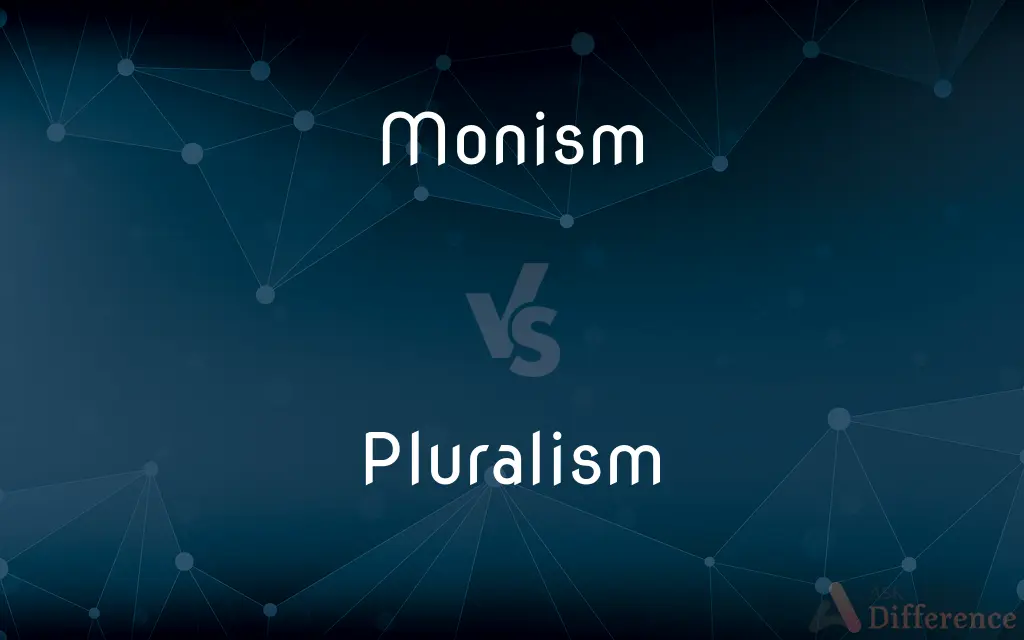Monism vs. Pluralism — What's the Difference?

Difference Between Monism and Pluralism
ADVERTISEMENT
Compare with Definitions
Monism
Monism attributes oneness or singleness (Greek: μόνος) to a concept e.g., existence. Various kinds of monism can be distinguished: Priority monism states that all existing things go back to a source that is distinct from them; e.g., in Neoplatonism everything is derived from The One.
Pluralism
The condition of being multiple or plural.
Monism
The view in metaphysics that reality is a unified whole and that all existing things can be ascribed to or described by a single concept or system.
Pluralism
A condition in which numerous distinct ethnic, religious, or cultural groups are present and tolerated within a society.
Monism
The doctrine that mind and matter are formed from, or reducible to, the same ultimate substance or principle of being.
ADVERTISEMENT
Pluralism
The belief that such a condition is desirable or socially beneficial.
Monism
The doctrine of the oneness and unity of reality, despite the appearance of diversity in the world.
Pluralism
(Ecclesiastical) The holding by one person of two or more positions or offices, especially two or more ecclesiastical benefices, at the same time.
Monism
The doctrine that there is a single source of political authority, especially that the church is subordinate to the state or vice versa.
Pluralism
The doctrine that reality is composed of many ultimate substances.
Monism
That doctrine which refers all phenomena to a single ultimate constituent or agent; - the opposite of dualism.
Pluralism
The belief that no single explanatory system or view of reality can account for all the phenomena of life.
Monism
See Monogenesis, 1.
Pluralism
The quality or state of being plural, or in the plural number.
Monism
The doctrine that the universe is an organized unitary being or total self-inclusive structure.
Monism means that the whole of reality, i.e., everything that is, constitutes one inseparable and indivisible entirety. Monism accordingly is a unitary conception of the world. It always bears in mind that our words are abstracts representing parts or features of the One and All, and not separate existences. Not only are matter and mind, soul and body, abstracts, but also such scientific terms as atoms and molecules, and also religious terms such as God and world.
Pluralism
(ecclesiastical) The state of a pluralist; the holding of more than one ecclesiastical living at a time.
Monism
The doctrine that reality consists of a single basic substance or element
Pluralism
(sociology) A social system that permits smaller groups within a society to maintain their individual cultural identities.
Pluralism
(politics) The belief that there should be diverse and competing centers of power in society.
Pluralism
(politics) The acknowledgement of a diversity of political systems.
Pluralism
(law) The existence of differing legal systems in a population or area.
Pluralism
(philosophy) The belief that values can be simultaneously antagonistic and incommensurable.
Pluralism
(philosophy) The belief that a plural predicate refers to its individuals rather than to a collective.
Pluralism
The quality or state of being plural, or in the plural number.
Pluralism
The state of a pluralist; the holding of more than one ecclesiastical living at a time.
Pluralism
The doctrine that reality consists of several basic substances or elements
Share Your Discovery

Previous Comparison
Megacity vs. Conurbation
Next Comparison
Clump vs. Lump















































